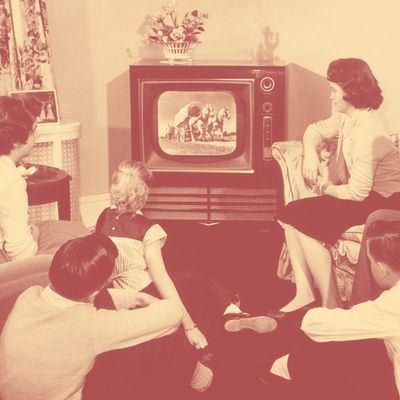
A plea: Could you maybe stop telling me I need to watch Breaking Bad?
I know. I know! I’ve heard how good it is, and how bingeable it is, and, yes, I also know it’s all on Netflix. But the more someone insists that I have to watch something, the more it makes me want to never watch it, just to — I don’t know — spite them, or to prove in some small, stupid way that I am my own person and I do what I want.
We are, as you may have heard, living in an era of “prestige TV” — episodes feel more like movies, seasons feel more like novels, and television in general is an acceptable topic of conversation at social gatherings. It’s great! Watching TV is fun, talking about TV is fun — it’s all great fun. But I’ve begun to dread these four words: Wait, you haven’t seen —-? Fill in the blank with the current or classic prestige show of your choice: Mad Men, The Wire, Stranger Things, whatever. The second someone says this, the TV banter takes on an irritatingly insistent tone, with everyone present who has watched the show piling on the person who admits that they have not, until this poor soul agrees that, yes, okay, they’ll finally start watching Westworld. This weekend. Promise. It’s supposed to rain, anyway.
We make these promises to be polite, and so that the conversation moves forward. And sometimes, we do intend to keep them. Other times, we do not. The harder someone pushes their favorite show, the more likely some people are to decide to avoid it entirely. The psychology writer Oliver Burkeman wrote about this tendency in a column for The Guardian last summer, suggesting that it may be explained by something called “optimal distinctiveness theory” — that is, “the way we’re constantly jockeying to feel exactly the right degree of similarity to and difference from those around us,” like a bunch of adult teenagers. He continued:
Nobody wants to be exiled from the in-group to the fringes of society; but nobody wants to be swallowed up by it, either. In toddlerhood and teenagerhood, this manifests as a bloody-minded refusal to do what we’re told, precisely to show we can disobey our parents. Perhaps it never entirely goes away.
That could explain it. Or maybe it’s something much simpler than all that: People just don’t love being told what to do. This has been illustrated in many entertaining experiments since the 1960s, when the theory of reactance was first conceived by social psychologists. Reactance, as researchers explained in a 2015 review of the literature, is the “unpleasant motivational arousal that emerges when people experience a threat to or loss of their free behaviors.” It helps explain why, for example, some people enjoy posting pictures of various Bills — Clinton, Gates, Murray — around signs that say “Post No Bills.” In experiments, psychologists have found that if they tell their study volunteers they can’t take this particular painting home, then that’s the painting most people will want to take home the most. A strongly worded note asking people to please refrain from writing on bathroom walls “tempted amateur artists to do so all the more,” writes science writer Rolf Degen in a blog post, “much more so than a casual reminder.” He continues:
The knowledge that they had received information which was purposefully censored caused a boomerang effect, making subjects particularly curious about the withheld content. Individuals who had been given accurate predictions about the things they would do in the near future spared no effort to act otherwise, just in order to refute these prophecies. And the mere assertion that there were efforts to muzzle citizens increased the number of signatures on a petition that had been arranged by the experimenter.
There are times, though, when I’ve managed to resist that urge to resist, and I do check out the pop-culture thing everyone is insisting that I check out. Sometimes, I’m glad I did — some things are popular for good reason. (Have you guys heard of Hamilton? So good!) And it’s understandable that people should excitedly tell their friends about the books and the movies and the shows they love; these things become more fun when you have someone with whom to discuss, say, the amazing therapist on Big Little Lies.
Still, with the knowledge of this psychological tendency in mind — could we all try to stop doing this? I can feel it happening now, this week, as my podcast-loving friends keep texting and Gchatting me about S-Town, aghast that I haven’t started it yet. Friends: Please don’t take S-Town away from me. Stop this now.
But also: All of you should really be watching The Great British Bake Off. It’s on Netflix!




